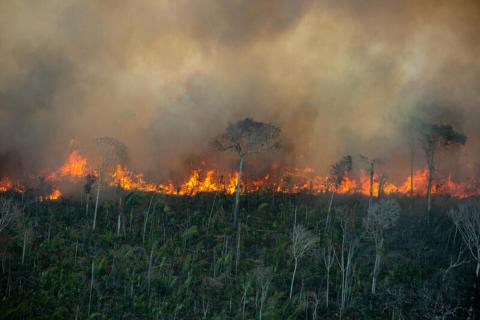"People need to consider what they truly want; they shouldn’t rely solely on schemes or incentives. Here, we do not depend on electricity or solar power for irrigation. Since the time of our ancestors, we have relied on rain and rivers, and we must rekindle that connection”, explains Sunita Paharia, a villager from the Rajmahal Hills. In this part of India, communities with a long history of resistance against the expropriation of their ancestral territory are rebuilding their autonomy and future.
Bulletin articles
Our community of Caisán, in Panama, is living proof that it is possible to stand up to an exclusionary hydroelectric development model and its harmful impacts. Through community organizing, we stopped the construction of hydroelectric dams that were being promoted as part of the Plan Puebla Panama – one of the largest development and integration projects of Latin America. Today, we are moving forward with the construction of a fair and community-based energy model.
WRM Bulletin 274 included an article on the work of the Earthworm Foundation, entitled: ‘NGOs at the service of plundering territories: the Earthworm Foundation case’. It describes how corporations which are causing conflict in the territories where they operate profit from cooperation with groups like Earthworm Foundation, while violence against community activists, landgrabs and sexual assaults of women continue.
How does one rebuild community ties and the “energy-joy” in communities whose territories have been devastated by predatory projects? The following text presents the proposal of the Environmental Clinic, a project that was created to help heal peasant and indigenous communities on the border between Ecuador and Colombia, whose social fabric was destroyed mainly by oil extraction projects. The 'Huipala Proposal' presents a way for these communities to move toward their utopias and recover the “energy-joy” of living, after suffering the traumas of territorial and social expropriation.
Across the global South, communities that oppose corporate control of their territories face not only corporate violence but also tear gas, batons and state repression. Challenging the expedient misinterpretation of “all land belongs to the State” that governments use to protect corporate interests, communities stand strong in the struggle to reclaim their ancestral lands “because it is a sacred place; it is a place that gives meaning to our existence.”
Under the guise of ‘conflict mediation’ and community empowerment, the work of certain corporate NGOs results in communities continuing without access to and control over their lands, and in strengthening destructive production models. One example is the Earthworm Foundation's partnership with palm oil agribusiness in several countries. See the article and interview below.
In South Africa's Western Cape province, rural communities affected by historical land dispossession in many places also face the manifold impacts of living surrounded by industrial tree plantations. Seeking to strengthen their access to land, these communities have mobilised in a forum supported by civil society organizations, demanding participation in decision-making and other community rights.
Several companies have been expanding their tree plantations in the Colombian Orinoquía, which is increasing longstanding conflicts and violence. “These are not reforestation companies, but deforestation companies, because they have introduced invasive tree species that are not native to the territory – like acacia, eucalyptus and pine trees. So they are driving out what naturally grows here” - Indigenous Sikuani Leader
A new wave of expansion in hydroelectric power plant projects is advancing throughout the Global South under the pretext of producing 'clean energy', speed up the 'energy transition' and promote a 'low carbon economy'. On March 14, a group of communities issued a joint declaration denouncing the trail of destruction that major dams have left in their wake worldwide, rejecting further dam construction and shouting out, loud and clear: big hydroelectric power plants are not clean energy!
The "Deklarasi Solidaritas Merauke" (Merauke Solidarity Declaration, see below) has been collectively written by participants of the "Konsolidasi Solidaritas Merauke" (Merauke Solidarity Consolidation Meeting), a people's gathering that took place in the town of Merauke, South Papua Province in March, 2025. The declaration calls for an immediate halt of the National Strategic Project (PSN) Merauke.
In the first months of 2025, forest fires once again affected hundreds of families and burned tens of thousands of hectares in Argentine Patagonia. In this context, we are recalling an article from Aguayala published in WRM Bulletin 259, which explains how industrial pine plantations have been one of the main causes of not only deadly forest fires, but also land grab, deforestation, water depletion and violent conflicts with Mapuche communities. At the same time, such plantations have been falsely promoted as a solution to climate change.
On November 22, the UN Climate Change Conference COP29 ended in Baku, Azerbaijan. At one of its sessions, Brazilian authorities spoke about the next one, COP30, to be held in the Amazon region. They did so in front of a mega photo of untouched Amazon forest. However, away from Baku’s spotlights, the reality of many Amazonian peoples is one of despair at the forest being consumed by forest fires.










